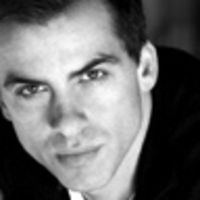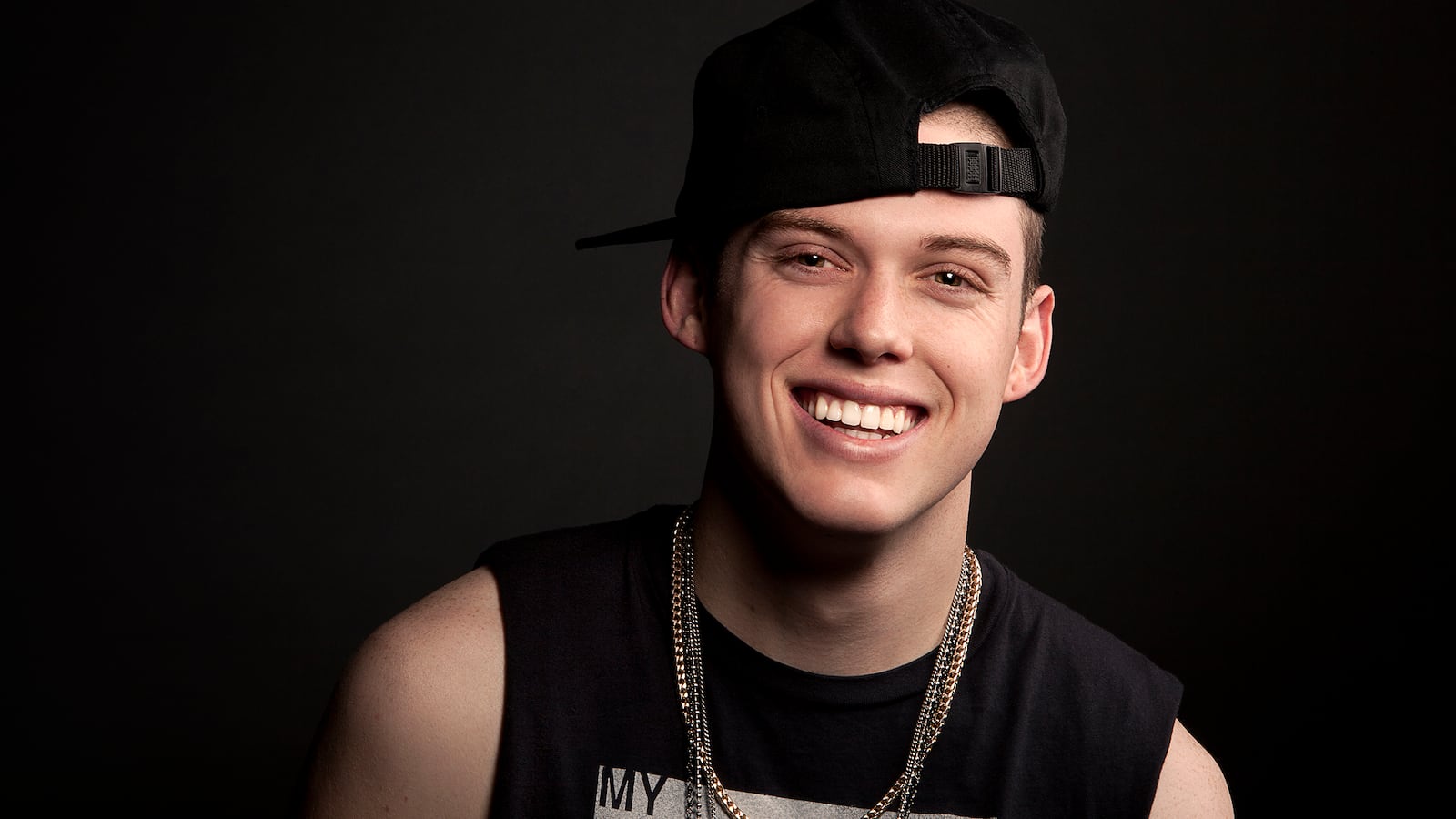Harry Hudson can pinpoint the exact minute he was booted out of the Garden of Eden.

An up-and-coming musician, Hudson was on the brink of stardom when life came crashing down. He had just managed to score a meeting with the legendary Martin Kierszenbaum, head of Cherrytree Records, the same guy who launched Lady Gaga's career. It was a good meeting. Kierszenbaum seemed impressed. But that sense of elation would last only a few short hours.
“It went from the best day to the worst day of my life,” says Hudson. “Everything you’ve worked for, everything you’ve dreamed of is about to come true, and then something unexpected hits you, and you have no idea what’s going on.”
That something unexpected was a tumor the size of a grapefruit in his chest.
Hudson, who’d been feeling a bit rundown, was rushed to the hospital that night after having difficulty breathing. His mom thought it was just another asthma attack. Other than the occasional wheezing, Hudson was a relatively healthy 20-year-old kid trying to make it in the music business.
“I had never been to the ER before, never had an IV in my life,” he says. “Then, the doctor comes into my room and says to me, ‘I hate to break it to you, but you have cancer.’”
Unlike his mother, Harry wasn’t the least surprised. “I knew I had cancer,” he says. “I felt it in my heart. I had dreams about it. Every now and then I’d wake from a cold sweat. But I was too scared to say anything.”
A biopsy revealed Hudson had Hodgkin's lymphoma, a cancer originating from white blood cells, which, if treated early, can be highly curable. Hudson had late stage three cancer. It wasn’t yet advanced, but it wasn’t localized either.
“I worked so hard, I put so much time into it and now I was probably going to die,” he says.
His family was worried too. Many of them jumped on the first available flight to Los Angeles, some from as far as Australia. “It scared the living daylights out of me,” Hudson says. “I hadn’t seen these people in two years and suddenly everyone is here to see me. That can’t be a good sign.”
Born in New Jersey, Hudson and his family moved to Los Angeles when he was four. His mom worked two jobs to support the family. His dad, a drug addict, was in and out of sobriety. Harry was the funny one, the artist.“Harry always marched to the beat of his own drum,” says Remington Rhodes, Hudson’s brother and manager. “We always used to say he’s in ‘Harry’s World.’”
At 19, he released his first song, “World Is Gone,” which went to No. 1 on Hype Machine, a popular MP3 aggregator. It stayed at the top for three days, out-pacing tracks by Maroon 5, Kendrick Lamar, and 50 Cent. The buzz around the song ignited just enough interest to get him several meetings with major record labels. It was tough knowing the disease had knocked him off his course. Momentum like that is hard to recreate.
Days after his diagnosis, he was laying in his hospital bed, feeling sorry for himself, when a rabbi came in with an unusual present. In his hands was The Zohar, the chief text of the Jewish Kabbalah. “He told me I didn’t have to be religious to read it and that the book was supposed to bring good energy. He said I should keep it under my pillow or on the place where it hurts.”
Hudson tossed the book aside as soon as the rabbi left the room. “I woke up in the middle of the night and someone was grabbing my arm. There was this warm feeling around me and it felt like I was being hugged. Someone was whispering to me, ‘You’re not going to die. You’re going to be fine.’ When I woke up the book was clenched to my chest. The same book I had tossed earlier.”
After undergoing surgery to remove the tumor, Hudson says he had another one of his dreams. “I had a weird reaction to some of the medication. I remember being in a heavenly place. It looked like a hotel suite. It was the nicest hotel suite I had ever seen.”
At first, Hudson says, he thought he’d been moved to a bigger, nicer recovery room. But when he looked out the window, he saw something that shouldn’t have been there. “I opened the blinds and saw the ocean and I was like, what’s going on? I love the ocean. And this was a beautiful ocean with clear water.” That’s when he says he saw his grandmother watering roses. “My grandmother had passed away before I was born,” he says. “She told me, ‘It’s not your time.’ Then I remember something pulling me back, and that’s when I woke up.”
Whether it was the medication or something he can’t explain, those two experiences managed to do what no doctor or friend or family member could—give him hope.“I hadn’t spoken a word in over a week, but that morning I started talking again. I felt great because someone told me I was going to be fine.”
Hudson was not only determined to win, he would document the fight for the world to see.
He took to Twitter and Instagram and began posting. Every few days, he’d upload a picture. One standing in a dreary corridor wearing nothing but a hospital gown, tubes sticking out of his chest; a few from his chemo chair; a couple of him praying, hands clasped under his chin, his head completely bald. The images are haunting. Some are difficult to look at. But something about their brazen honesty struck a chord with cancer patients all over the country.
Hudson’s Instagram account suddenly blew up, going from a few thousand to 180,000 followers. His pictures were getting a whopping 30,000 likes each, right up there with Madonna and J-Lo. He was also flooded with messages. One mom emailed him to tell him her son stopped singing after being diagnosed with brain cancer, but thanks to Hudson’s inspirational photos, he had picked it up again. Others just wanted to meet him. “I had this kid come up to me saying, I have an 11-year-old brother and he beat cancer because of you,’” says Hudson.
Soon, the Internet started to take notice. Blogs and music sites were swooning over this kid and his unapologetic pictures. His story was straight out of a made-for-TV movie: cute rising star finally gets his big break, only to discover he has stage-three cancer, but then fights to live another day while inspiring thousands of people in the process. Who could resist that?
The fact that he was close to the Jenner girls, Kylie and Kendall, didn’t hurt either. “I was losing friends left and right. People weren’t able to deal with my cancer,” says Hudson. “Kylie and Kendall came when nobody else did.”
He says they met through acquaintances. When Hudson became sick, the Jenner girls came to visit regularly. Kylie was seen coming in and out of the hospital so frequently that celebrity blogs began speculating whether the two were secretly dating. A picture of their feet touching over the caption, "always here for you," posted on her Instagram account, only added fuel to the rumors.
Hudson insists there was nothing romantic about those words. He points to the IV stand in the corner of the picture, clearly showing it was taken during one of his chemo sessions. “I would do anything for those girls,” he said. And just like that, the Jenners don’t seem all that vapid. Not one bit.
After more than seven months of chemotherapy, Hudson is now cancer free. His hair is finally growing back. “It’s really weird,” he says about his new baby locks. It’s hard to tell, looking at him now, he was ever sick. His days are spent in a studio in Los Angeles, working on his music.
Last week, he released “Learn to Love,” the first of 12 tracks written during his 12 chemo sessions. The video for the song is from footage taken during his hospital stay.
“I call it dark pop,” Hudson says laughing, “more passionate and more eerie.”
If there’s a silver lining to this story, it’s the fact that Hudson has a whole new appreciation for life. If BC (before cancer), Hudson was all about making money and becoming famous, these days, he’s more interested in helping people, specifically young people with cancer. Profits from his first single are going entirely to the American Cancer Society, which has made him an honorary chair.
“Harry’s openness allows others to see that it’s okay to talk about cancer, which is often a very difficult thing to do,” says Eric Belkmann from the American Cancer Society.
But perhaps more importantly, Hudson says his struggle to survive has changed everything. "At first, I was like, I can make a catchy song, I can sell this song, make a lot of money," he says. "Now I'm like, I don't really want anything." In other words, Hudson says, he's a singer who has finally found his voice.





